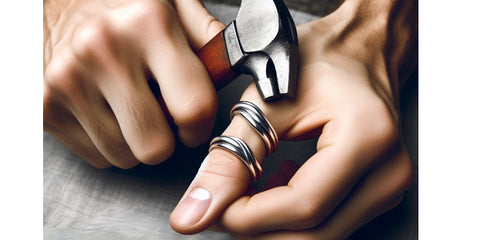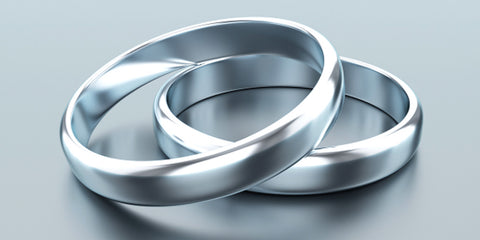Free Shipping On Orders Over $24.99 | SAVE 15% ON YOUR NEW RING TODAY - USE CODE: BELOVED
Free Shipping On Orders Over $24.99 | SAVE 15% ON YOUR NEW RING TODAY - USE CODE: BELOVED
Discover the secrets of ring durability and the Mohs Hardness Scale in this comprehensive guide by Steven G Designs.
In the world of jewelry, durability is a crucial factor to consider when choosing a ring. The last thing you want is for your ring to get damaged easily or lose its shine over time. That's where the Mohs Hardness Scale comes into play. By understanding this scale, you can make informed decisions and select a ring that will stand the test of time.
When it comes to jewelry, durability refers to how well a ring can withstand daily wear and tear without damage or deterioration. Rings go through a lot - they are exposed to various environmental factors, such as moisture, impact, and chemical substances. Therefore, it is essential to choose a durable ring that can withstand these challenges and remain beautiful for years to come.

Durability is particularly crucial in jewelry because these pieces often hold sentimental value. A ring may be an heirloom passed down through generations, a symbol of love or commitment, or simply a cherished accessory. Regardless of the reason, it is essential that the ring can withstand the test of time and preserve its beauty for generations to come.
Several factors can affect the overall durability of rings. One of the primary considerations is the material used. Some materials, such as gold, silver, tungsten or platinum, are known for their strength and resistance to tarnish. These metals are often chosen for their durability, ensuring that the ring will remain intact and lustrous even with frequent use.
However, it's not just the metal that determines a ring's durability. The type and quality of gemstones used can also play a significant role. Some gemstones, like diamonds, sapphires, and rubies, are known for their hardness and durability, making them ideal for everyday wear. On the other hand, softer gemstones like opals or pearls may require extra care and attention to prevent damage.
In addition to material, the design and construction of the ring can impact its durability. Rings with complex settings or delicate structures may be more susceptible to damage compared to simpler designs. For example, a ring with a prong setting may be more prone to snagging or losing stones than a ring with a bezel setting that offers more protection. It's important to consider your lifestyle and habits when choosing a ring to ensure it can withstand your daily activities.
Furthermore, proper maintenance and care are essential for preserving the durability of a ring. Regular cleaning, inspections, and professional maintenance can help identify and address any potential issues before they escalate. Taking the time to care for your ring will not only enhance its longevity but also allow you to enjoy its beauty for years to come.
The Mohs Hardness Scale is a system used to measure the relative hardness of various metals, minerals and gemstones. It was developed by Friedrich Mohs in 1812 and is still widely used today. The scale ranges from 1 to 10, with 1 being the softest and 10 being the hardest. It serves as a useful tool in assessing a material's durability and its ability to resist scratches and abrasions.
Understanding the Mohs Hardness Scale is essential for gemologists, jewelers, and geologists alike. By knowing the hardness of a metal, mineral or gemstone, professionals can determine its suitability for specific uses. For example, a metal with a high Mohs rating would be ideal for the creation of a wedding band, as it can withstand daily wear and tear better than a softer metal.
The Mohs Scale measures a material's hardness by evaluating its scratch resistance. A harder material can scratch a softer one, while a softer metal will be scratched by a harder one. Mohs assigned ten categories to different hardness levels, with talc being the softest at level 1 and diamond representing the hardest at level 10.
When Friedrich Mohs created the scale, he selected minerals that were readily available and had distinct hardness differences. This selection allowed for a practical and easy-to-use method of comparing the hardness of various materials. Over time, the Mohs Scale has become a standard tool in the field of mineralogy and gemology, providing a quick and reliable way to assess hardness.
The Mohs Scale is based on a simple principle - if one substance can scratch another, it is harder. On the scale, a material of any given level can scratch materials of a lower level. For example, a gemstone with a Mohs rating of 8 can scratch any mineral with a rating of 7 or below.
It's important to note that the scale is relative and not linear. The gap in hardness between each level is not equal. For example, tungsten carbide, which has a rating of 9, is significantly harder than a metal with a 6 rating, such as, titanium or platinum with a 3.5 rating.
Geologists often use the Mohs Scale in the field to quickly assess the hardness of unknown materials. By performing a simple scratch test with common materials of known hardness, they can approximate the hardness of the material in question. This information is crucial for identifying materials and understanding their physical properties.
Understanding the Mohs Scale can help you assess the durability of different wedding bands and make an informed decision when choosing a ring.

Generally, the higher the Mohs rating of a metal, the more durable it is. Metals with higher ratings are less susceptible to scratches and can withstand daily wear better. For example, tungsten carbide rings, with their Mohs rating of 9, are extremely tough and highly resistant to scratching. This makes them an excellent choice for wedding bands or pieces that will be worn every day.
On the other hand, metals with lower ratings, such as platinum, are more delicate and require extra care to prevent damage. While this metal can still be used in rings, it may be better suited for occasional wear or special occasions.
When selecting a wedding band, it's important to consider both the Mohs rating of the metal and your lifestyle. If you lead an active lifestyle or work with your hands, you may want to opt for a material with a higher Mohs rating that can withstand more wear and tear. On the other hand, if you plan to wear the ring occasionally or for formal events, a wedding band with a lower Mohs rating can still be an excellent choice.
The Mohs Scale ratings for different ring materials can vary significantly, and it's crucial to be aware of these differences when choosing a ring.

Tungsten carbide is renowned for its exceptional hardness and durability. With a Mohs rating of 9, it is about 10 times harder than 18 karat gold and 4 times hard than titanium. Its exceptional strength makes them a perfect choice for wedding bands that will be subjected to constant wear.
Titanium is a lustrous metal with a silvery color that is often used in the creation of wedding band. It has a low density and a high strength and is resistant to corrosion. It Mohs hardness is rated at 6, which is significantly lower than tungsten.
Platinum is a silvery-gray precious metal that is very dense. However, it is relatively soft with a Mohs hardness of only 3.5 and can be much more easily scratched than either tungsten or titanium.
Gold is a popular choice for rings due to its beauty and versatility. However, pure gold is relatively soft and easily scratched. As a result, it is often alloyed with other metals to increase its hardness and durability. The Mohs hardness of gold typically ranges between 2.5 and 3, depending on the specific alloy.
Silver is a highly reflective metal that is popularly used in the creation of jewelry. It is similar in hardness to gold at a Mohs hardness of 2.5. This softness means that it can scratch easily and requires care when wearing.
|
Metal |
Moh’s Hardness |
|
Tungsten Carbide |
9 |
|
Titanium |
6 |
|
Platinum |
3.5 |
|
Gold |
2.5 - 3 |
|
Silver |
2.5 |
Rings made of a metal rated higher on the Mohs Scale require less maintenance and care. However, this doesn't mean they are invincible. To ensure their longevity, it's recommended to remove such rings during activities that may expose them to unnecessary risks, such as intense physical activities, household chores involving harsh chemicals, or heavy impact situations.
Regular cleaning and inspections are also vital for high-Mohs materials. While they are less prone to scratches, prolonged exposure to dirt, oils, and contaminants can dull their brilliance. You can clean your ring with warm water and mild soap, gently scrubbing off any residues. Professional cleanings from a trusted jeweler can also help maintain their luster.
Rings with a metal rated lower on the Mohs Scale require extra care and attention. These rings may be more vulnerable to scratches and damage from everyday activities. It's important to avoid wearing them during activities that may cause significant impact or scratch their surface.
When cleaning rings with lower Mohs ratings, it's advisable to use a soft cloth or a brush with gentle bristles. Avoid using harsh chemicals or abrasive cleaners, as they can damage the ring's surface. It's also important to store these rings carefully, keeping them separate from other jewelry to avoid potential scratches.
By understanding the Mohs Hardness Scale and its implications for ring durability, you can make informed decisions and choose a ring that will remain beautiful and withstand the test of time. Whether you opt for a ring with a high Mohs rating or one with a lower rating, proper care and maintenance are crucial to preserving its beauty and longevity.
Investing in a ring that matches your style, preferences, and lifestyle is a decision that requires careful consideration. Take the time to explore the various options available and consult with a reputable jeweler who can provide expert guidance based on your needs. By understanding the importance of durability and the factors that influence it, you can confidently select a ring that will be cherished for years to come.
Check out the best in strong and durable tungsten wedding rings on our website - Steven G Designs!
Comments will be approved before showing up.
